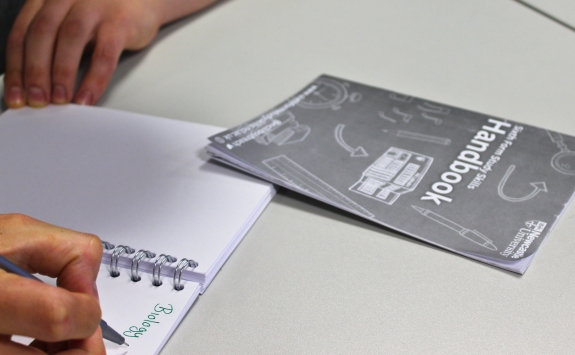Lecturers will often reiterate the need for good communication skills when it comes to tasks such as presentations, seminars, or group work, sometimes with little explanation on how to develop them. Communication skills cover a broad range of verbal and non-verbal communication and I think it is essential to develop both. In this blog post I’ve taken three university-based situations and shared tips that I have learnt that have helped me improve both types of skill.
Verbal Communication – Presentations
For many students, presentations (whether in a group or by yourself) will be a new sort of assessment and one that isn’t always tested at A-Level. It is normal to feel nervous before presenting, but I have found three tips that have elevated my confidence at public speaking that work for both recorded and live presentations.

1. Using presentations as an aid
Listening to lectures as a student, it can be easy to see what makes a good PowerPoint. If there are too many photos on the slide it can often be distracting, and if there are too many words it can feel very hard to engage with the person delivering the presentation. Therefore, when I make presentations, I always think about what topic I am speaking about on each slide. Not only does this make the information more relevant, but also allows the presentation to be used as an aid rather than a script.
2. When to practise
I have found that preparing a week in advance can help settle nerves and provide time to improve my flow and confidence. The preparation time might vary depending on how you manage your time or the priority of another assignment, but it is important to allocate a few hours on it before the day it is assessed.
3. How to practise
Practising delivering a presentation can be done alone or in front of friends and family. I have found it particularly helpful practising in front of people as it allows me to get a rough idea of how it might feel on the day. This helps me feel more comfortable, as well as giving me time to work on any feedback people give me.

Verbal Communication – Seminars
One of the biggest differences from sixth form to University is the introduction of seminars. The number of students and the topic being discussed will change from week to week. Contributing ideas to a group of people at first seems nerve-wracking. I have found that that listening to other peoples’ ideas and putting forward my own allows me to gain more of an understanding around the topic which I can then use in future assignments. One habit that I have tried is to contribute at least once per seminar.
Written Communication – Essays and lab reports
Writing essays or lab reports can be one of the most challenging parts of university. The transition from studying STEM based A-Levels to my first year studying Biology where there was an expectation to write multiple thousand-word essays was very daunting. Along with many of my course mates, I often didn’t know where to start. When I’ve been in this position, I have found speaking to a lecturer after a lecture or by email can be very helpful to understand exactly what is expected and to avoid going off topic. This makes assignments clearer and more concise which in turn improves your written communication and chance to achieve higher grades. When friends are doing the same assignment, speaking it over with them can ease any pressure you might feel.
Responding to feedback
When receiving a lower grade than expected for assignments, it can sometimes feel demotivating. Advice that has helped me develop my written or verbal communication is to always read the feedback from the lecturer. There may be small changes you can do that could boost your grade next time. If you are still unsure after looking at the feedback, most lecturers have office hours and are happy to answer any questions.
Overall, it is important to recognise everyone can be at different stages of developing their communication skills and you might feel more comfortable in certain situations than others. It is important not to worry if you feel better at one mode of communication than another and it is all about getting as much practise as possible.
Written by Tom, a BSc Biology student



